Devon Rex vs Sphynx: Differences and Characteristics
Two of the popularly in-demand cats all over the world are the Devon Rex and the Sphynx. Both cats share many similarities, but differences exist between them as well. They are unique and pleasant, so most cat lovers opt to get either.
For those looking at potential cat breeds to bring home, a long list of factors needs to be considered first. It includes size, overall appearance, needs, and, most of all, personality. To know which cat is right for you, we’ve written a comparison highlighting their traits and individuality.
Table of Contents
Breed Origins
Devon Rex
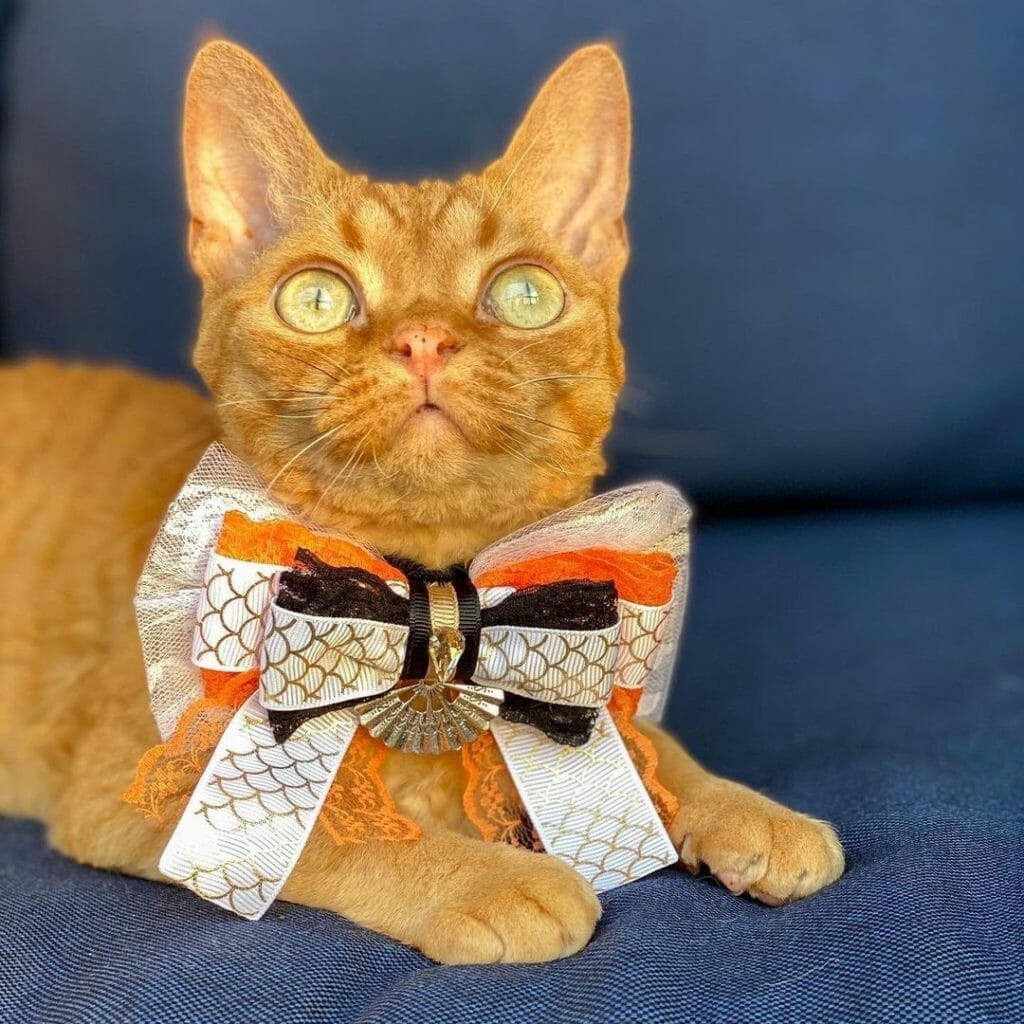

Based on his name, the Devon Rex originally came from the Devonshire region of England in 1960. Records suggest that a female short-haired cat mated with a stray tomcat whose coat was out of the ordinary as it was curly. One kitten out of the litter carried on the peculiar feature and was named Kirlee.
People thought Kirlee shared the same genetic pattern as the Cornish Rex, so breeding between the two breeds occurred to produce more kittens with the same curly fur. Sadly, the experiment wasn’t successful since the litter was born with straight coats. It was eventually discovered that genetic mutation caused the odd quality of hair.
Another breeding program was carried out, and this time, goals were achieved involving Kirlee. The US had its first imported Devon Rex in 1968, and the breed eventually got recognized by the Cat Fanciers’ Association in 1979.
Sphynx
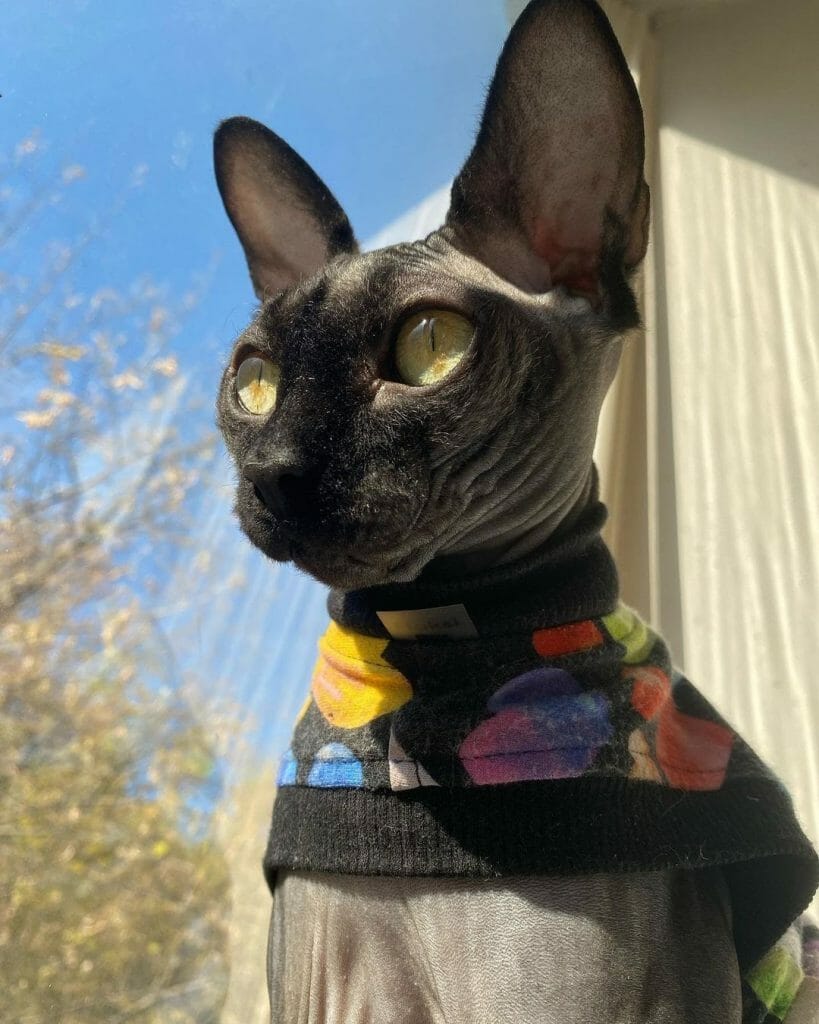

Ancient Aztecs bred hairless cats in the past, but surprisingly, the cats they developed had nothing to do with the Sphynx breed. Instead, this one comes from Toronto, Canada way back in 1966. A genetic mutation happened, thus the remarkable nude appearance of the feline.
Breeders who liked the Sphynx’s odd looks continued to breed those who constantly delivered hairless offspring.
Originally, the breed was known as the Canadian hairless cat, but when he made his way to the US, experts further developed him until they achieved the image they had in mind. Until now, the Sphynx remains a popular choice in Northern America, and his fame is gradually spreading throughout Western Europe.
Several cat clubs, like The International Cat Association, recognized the Sphynx as an official breed in 2005. Meanwhile, other registries refuse to recognize the feline based on its genetic abnormality, which might impact the cat’s health in the long run.
Size, Appearance, & Coloring
Devon Rex
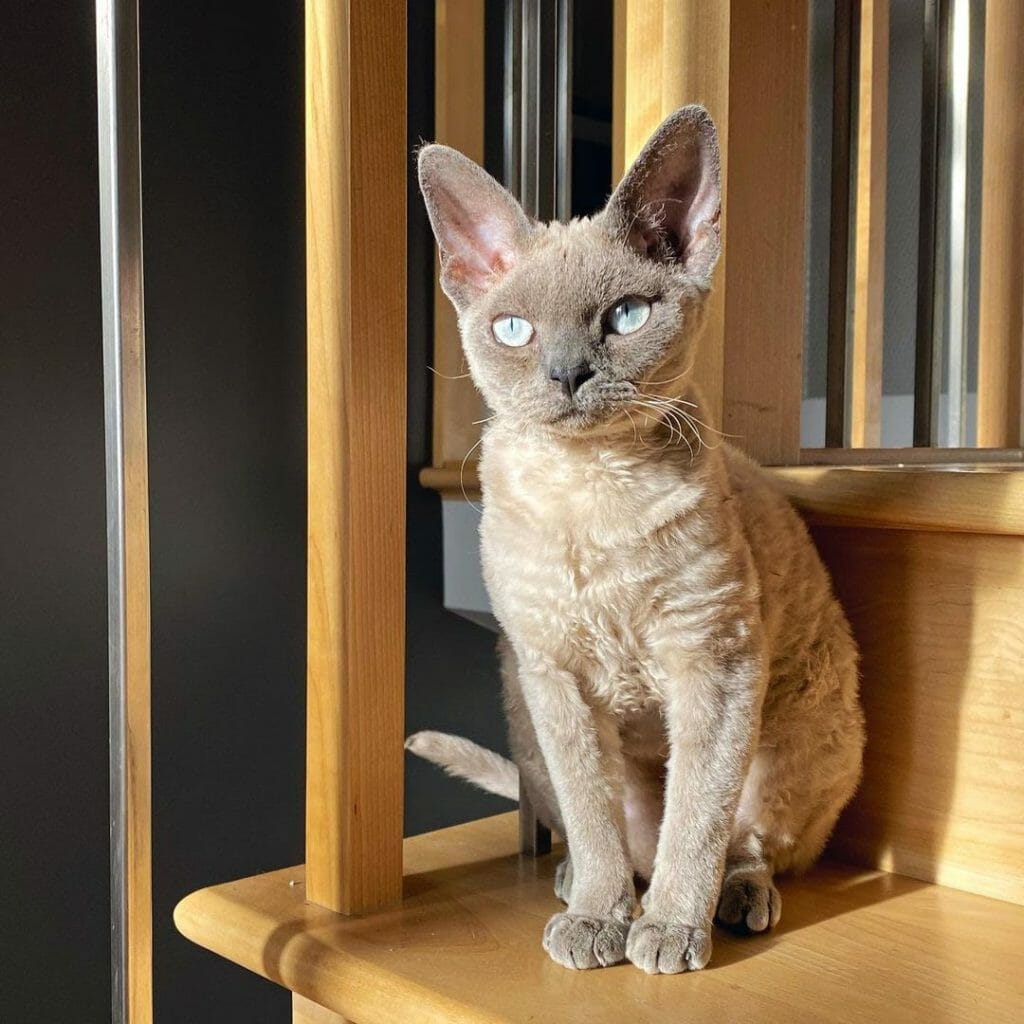

You can effortlessly distinguish the Devon Rex based on his mischievous look, long ears, and large round eyes. He’s a small-to-medium cat with an average of 6 to 9 pounds in mass and 10 to 12 inches in height. His features combined make him look cutely alien-ish, and that’s what most people are drawn to. His peculiar appearance includes high cheekbones, a long neck, and a slender body. Of course, his well-known trait is his particular curly coat that looks like he just got out of the salon.
He is covered with short fur, which gets less dense in certain areas like the ears, neck, head, chest, abdomen, and paws. You might often mistake the Devon as the Cornish Rex breed, but upon closer look at their coats’ length, the latter has it longer.
All-natural colors found in this breed are:
- Cinnamon
- Black
- Blue
- Chocolate
- White
- Lilac
Sphynx
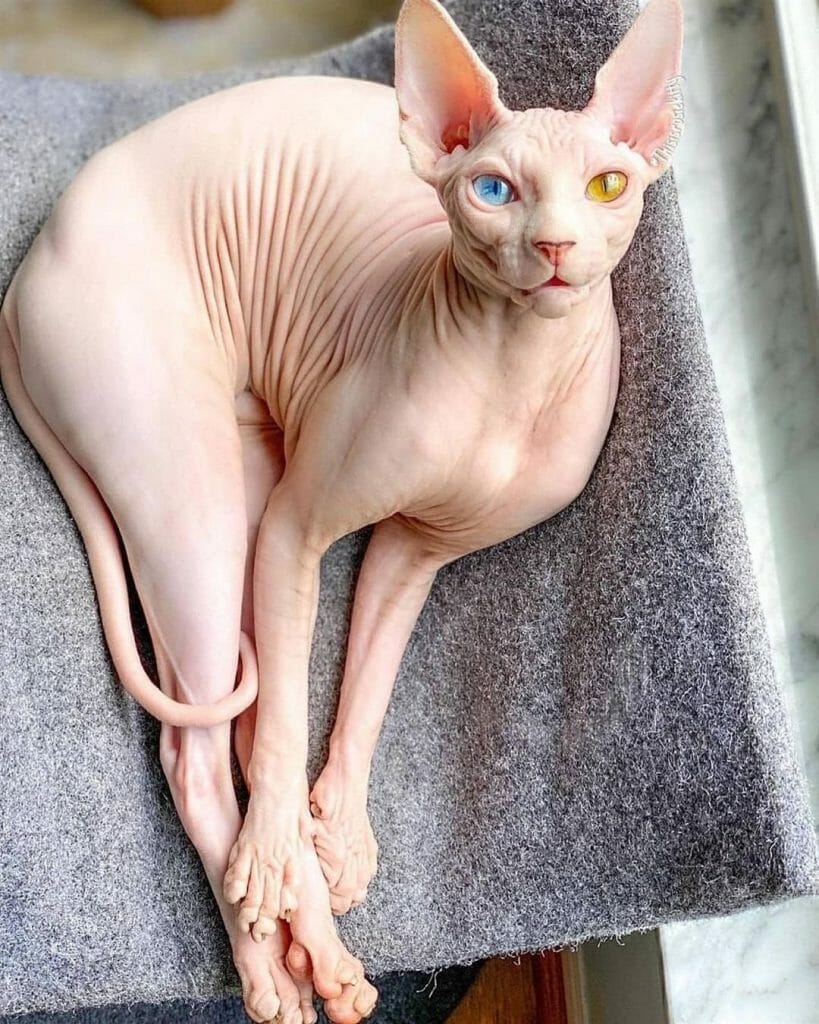

Although we often think the Sphynx cat has no hair, the contrary is true. He is still covered with hair but is too fine to get noticed. Some have sparse eyebrows that help them express their emotions, while others don’t have anything at all.
Considering his measurements, the Sphynx is a medium-sized cat who can weigh at least 6 to 14 pounds. Looking past his nudity, other features that define him are his finger-like toes, large ears that almost resemble that of a bat, a big, round belly, and eyes that are lemon-shaped. Another characteristic of the Sphynx is his wrinkles, evident due to the lack of hair.
The Sphynx can be in various colors, which may include:
- White
- Black
- Chocolate
- Red
- Lavender
Temperament
Devon Rex
Nothing is more outgoing than the Devon Rex! He loves to spend most of his time playing and making friends with the other pets or kids in the house. Although that’s the case, he might shy away from rough plays and avoid aggressive playmates.
True to his mischievous looks, Devon Rex indeed has clownish behavior. He loves to do anything that will catch your attention, and entertaining his loved ones is his ultimate goal daily. He can sometimes act too overwhelming and demanding, but this is part of his character.
Study shows that this English cat retains most of its kitten qualities even when he gets old, which ticks the box for most cat owners.
Sphynx
Despite the nudity, the Sphynx breed is not shy at all! If he needs something, he’ll communicate it with his owner right away. He’s also outgoing, so making friends with new pets isn’t challenging. Another trait of his is his curiosity. Paired with his level of intelligence, he will search for answers to his inquiries.
For those who love to chat with their cats, the Sphynx will surely give you his response. He’s extremely vocal, so expect to hear his voice all over the house. He can be clingy at a point since he always says yes to a cuddle with his favorite humans. For some, the cat’s need for attention may seem too much to take in, but for those who can tolerate it, they are listing themselves up to a great life with the most loyal companion ever!
Exercise Needs
Devon Rex
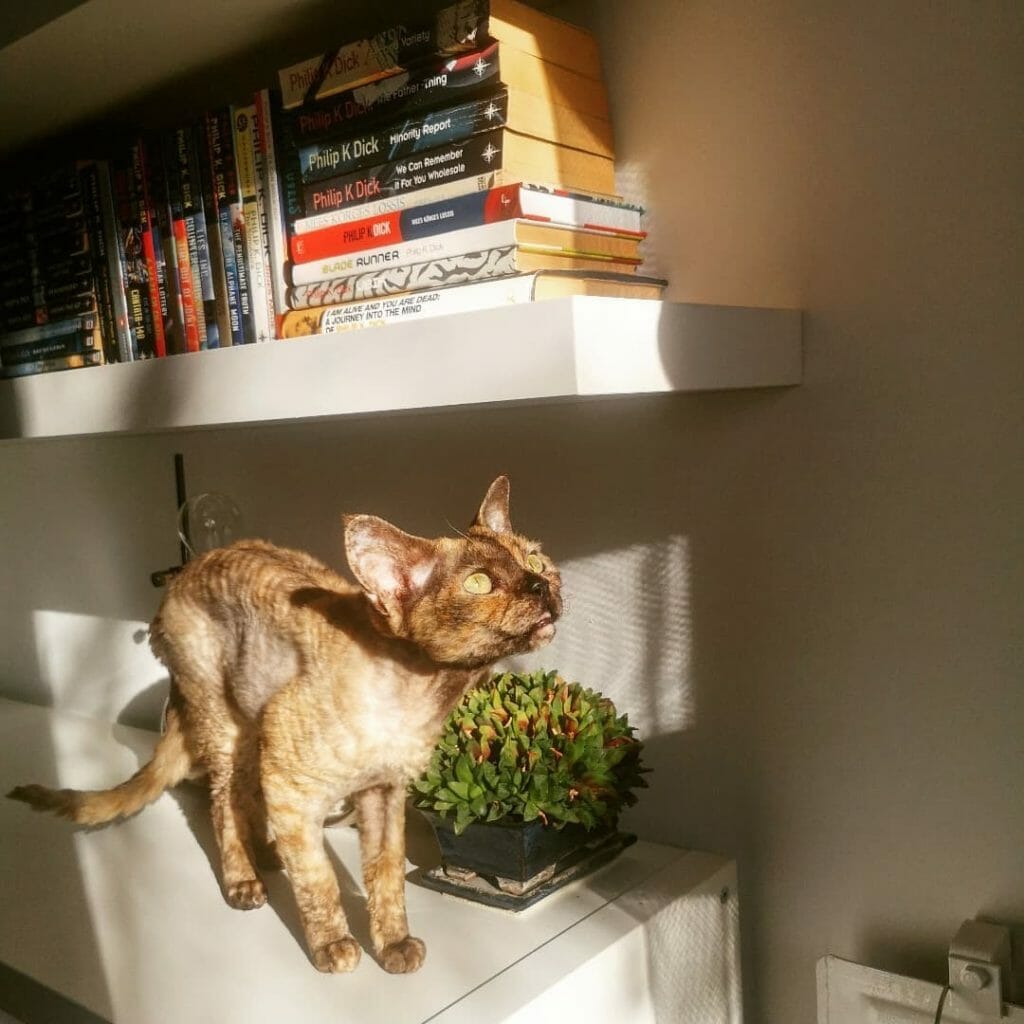

The Devon Rex cat breed is far from complex. When it comes to exercise, they wouldn’t require too much. Simply provide him various opportunities to play and have fun while at the same time keeping the weight down. It would be nice to have trees in your yard or a cat tower inside your home where he can constantly climb on.
If you want him to have mental exercises, incorporate training such as playing a game of fetch with him or learning certain behaviors.
Sphynx
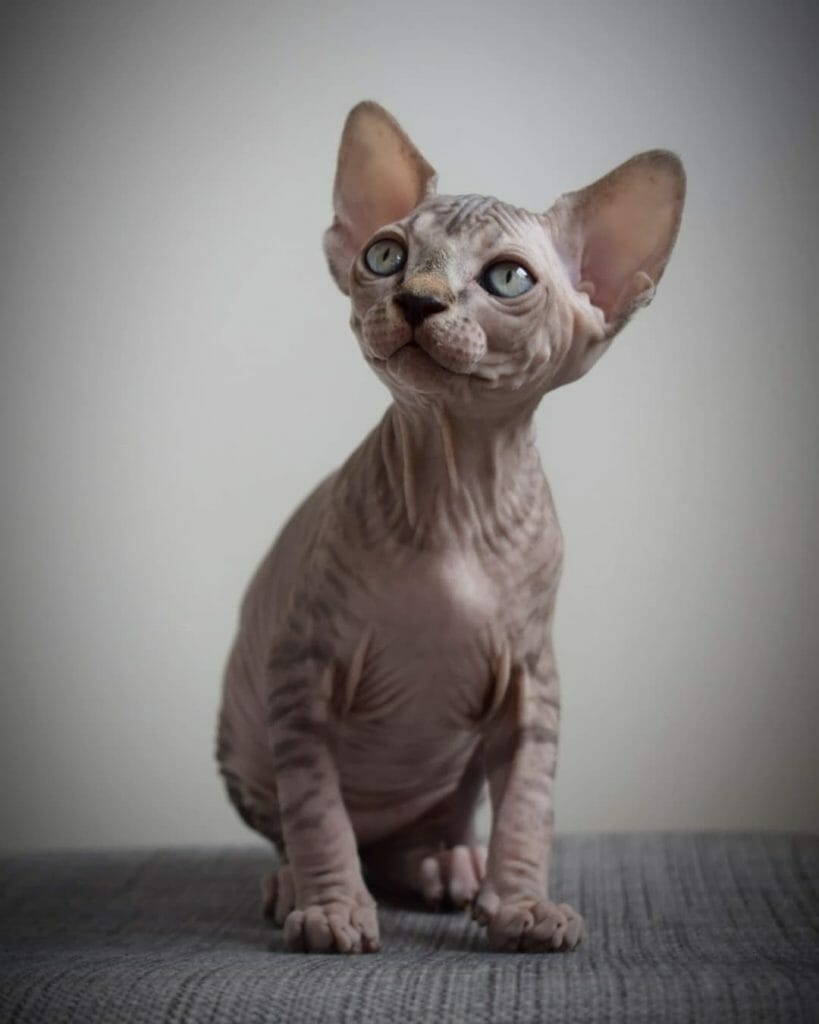

The Sphynx cat breed has high activity levels but low exercise requirements. The cat does well by just cuddling and spending time with his family, but of course, it is mentally and physically beneficial for him to get moving from time to time. He’s a natural athlete and need an area to showcase it.
Bring him toys to play with, and you’ll see how excellent his hunting skills are.
Grooming Requirements
Devon Rex
The breed’s thinly dispersed coat is highly prone to breakage so it would need proper care, and if possible, avoid brushing the cat often. Instead, You can use a damp cloth to keep his coat clean and tidy. Since the Devon Rex’s hair also constantly gets greasy, baths can be executed. Use mild cat-appropriate shampoos and rinse the product off with lukewarm water.
Sphynx
The lack of hair doesn’t mean less need for grooming. Since there isn’t enough fur to absorb the natural oil, the Sphynx’s skin must be groomed regularly. To prevent oil build-up, give him a wash weekly. Don’t forget to reach the in-betweens of his skin folds to ensure he’s 100% clean.
Health Problems
Devon Rex
A lifespan of 9-15 years is common to the Devon Rex breed. However, despite being healthy, risks can still affect his health sooner or later, depending on his lifestyle. With the right care, the Devon Rex may avoid getting the following:
- Patellar luxation
- Infections
- Allergy
- Dermatitis
Sphynx
Sphynx cats enjoy about 9-15 years, but just like other breeds, they are susceptible to several health issues like the following:
- Respiratory issues
- Hypertrophic cardiomyopathy
- Infections
- Hereditary myopathy
Cost per Kitten
Devon Rex
Adoption: $75 to $150
Reputable Breeder: $1,200 to $1,800
Sphynx
Adoption: $75 to $175
Reputable Breeder: $1,500 to $3,000
Which Cat Is Right for You?
Both cats are not that hard to take care of. They have almost the same personalities, with quirky and silly natures and playful sides. Grooming needs differ, but neither one is high on maintenance. They can do well on their own when it comes to exercise too. So you can consider how they both look to decide which catsuit your preference and, of course, see what lifestyle you have that can support either of them!
When comparing the hypoallergenic qualities of the Devon Rex vs. the Sphynx, both breeds are often favored by individuals with allergies. However, some people may find the Devon Rex slightly more hypoallergenic than the Sphynx due to its shorter and less oily coat. However, it’s important to note that individual reactions to cat allergens can vary, so spending time with both breeds is recommended to assess personal sensitivity levels.
